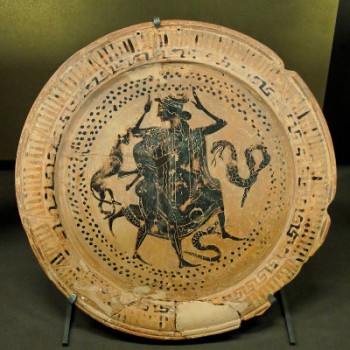
August 31, 2014, by Esther Eidinow
Thinking about Thinking about Ancient Greek Religion (2)
In January 2014, the Ancient Religions and Cognition (ARCog) project held its second workshop: on Transmission. Esther Eidinow gives an overview of the meeting, during which participants explored the theme of religious transmission using cognitive theorizing to think about ancient evidence, and vice versa.
You can find out more about the project and the workshop, and watch a film of the meeting here.
This meeting followed ArCog’s first workshop on religious authority. Together these two meetings comprise the initial events of a longer-term project, developed by Dr Esther Eidinow at the University of Nottingham and Professor Tom Harrison at Liverpool University. The project aims to develop a network of scholars to explore interactions between ancient religions and cognitive approaches to religion.
This workshop focused on religious transmission. On the first day, before the meeting proper began, Luther Martin, University of Vermont, held a discussion on ‘Evolution, Cognition and Historiography.’ This was attended by participants who wanted to think about the relationship between historical analysis and cognitive approaches more generally–and there was lively discussion about the theoretical problems facing scholars who want to take an interdisciplinary approach, and the question of what we mean by ‘religion’.
In the afternoon, the meeting began with three presentations on cognitive approaches to religious transmission: Jesper Sørensen, University of Aarhus, on ‘The Epidemiology of Representations and Cultural Immunology; Robin Dunbar, University of Oxford, on ‘The Origins of Religion as a Small Scale Phenomenon’; and Robert McCauley, Emory University, on ‘Ritual and Memory’; this was followed by a plenary discussion.
On the second day, Greg Woolf, University of St. Andrews (and now at the ICS) and Jan Bremmer, University of Groningen, presented the group with ancient evidence to consider in light of the cognitive approaches they had discussed the previous day. Greg Woolf discussed concepts of ‘Posterity in the Arval Acta’ and Jan Bremmer presented on miracles in the context of the spread of Christianity. The group stayed in plenary to discuss their responses, ideas and possible ways to proceed.
Discussion was animated: scholars from both disciplines were open about their questions and doubts about combining two different disciplines, as well as ideas for the possible future directions that collaborations might take. The ArCog network hopes to develop more meetings in the future–and anyone interested should get in touch with Esther Eidinow (esther.eidinow@nottingham.ac.uk).
Image: Peleus and Thetis, Boeotian black-figure dish, ca. 500 BC–475 BC.
Louvre CA 2569. Image: Jastrow (2007) [Wikimedia Commons]
No comments yet, fill out a comment to be the first

Leave a Reply